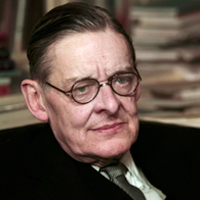Preludes by T. S. Eliot: Summary
'Preludes' is a chain of four short poems composed by T. S. Eliot which was published in his first collection, Prufrock and Other Observations, in 1917. The first poem in 'Preludes' is a winter evening scene at six o'clock. The smell of steak cooking in passageways tells us it is dinner time. A brilliant image expresses the evening as the stub-end of the "smoky days". A wind is bringing a hint of rain and blows withered leaves from here to there. Newspapers are blown away across the street. The detail could well be taken from an American city. A cab-horse sweats ("steams") and stamps its feet at the corner of the street. The gas-lights are lit. The prelude I concludes with the scene of night and the lightening of the street lamps.

T. S. Eliot (1888-1965)
Eliot paints the scene vividly with a few concrete physical details, a sketch which is more effective than a complete painting. The mood is one of disenchantment, deadness and "dehumanization." Words like "burnt out", "grimy", "withered", "broken", "lonely" all convey these feelings of deadness, sordidness, defeat and death.
In the second poem, Prelude II, the scene changes to morning, and Eliot changes the form of his verse to something nearer regular stanzaic pattern, to convey a slightly more hopeful note. But the sordidness is continued into the morning scene, though people are rising from the bed and marching to the workplace. "Stale smells of beer" surround the workers as they stamp down the "sawdust-trampled street" with their muddy feet. The atmosphere is one of "hangover" after a night of wickedness. Many people are being ready to act the daily pretense of life, the monotonous life of work, school, old faces and the like. Life goes on, but it is a meaningless ritual.
Prelude III startles the reader by an abrupt change of tone, a direct address to us saying ‘You’: You tossed a blanket from the bed. This time, the focus is on lying awake at night, unable to sleep. Eliot's prostitute like Berthe (the prostitute Berthe of Bubu de Montparnasse) thinks confusedly of last night and all the nights. ("The thousand sordid images). The light creeps up with the dawn in between the shutters and the sparrows begin to chirp.
As she sits up in bed nursing her "yellow" feet with dirty hands and then takes the curling papers out of her hair, she remembers the street of the night before where she tramped soliciting customers. Her "vision of the street is one that the street by daylight (the apparently respectable life of the bourgeoisie) cannot understand or rather will not understand because it does not choose to; You had such a vision of the street, As the street hardly understands;
When we are awake throughout the whole night many unpleasant thought come in and we feel different about the outside world, meanwhile other people are ignorant about our thought and are blissfully happy and asleep. The dark soul of the night hovers around us. We see the actual world of pain and despair and indifference. However, every morning we have to get up to accomplish the routine life.
Prelude IV moves to the street itself, which like the fog in "Prufrock" is personified. The street lies like a collapsed body tramped over by "insistent feet" the feet of the office workers returning at 4 and 5 and 6 o'clock. It is evening again. The opening line reminds us of the Prufrock image of the patient etherized on the table. The scene is again suggested by a few deftly drawn lines: "short square fingers stuffing pipes", "evening newspapers."
In the last seven lines you have the- only direct commentary by the poet on the scene; and the commentary is self-contradictory and deliberately baffling. First Eliot tells us that he is moved by fancies built up around these images of the city streets, images that make him feel deep pity for human suffering, for the suffering of the gentle innocent, as one might pity the prostitute or the wretched poor of the great city. Then he deliberately invites us to sneer at this show of sentiment.
Wipe your hand across your mouth, and laugh
The universe is indifferent to all our suffering. The stars shine still. Things remain same, the world keeps on moving round. There is no escape route from the monotonous everyday life of modern man in the city: you get up, you go to work or school, you come home, you try to sleep, and you get up again to do the same. This image of ‘Preludes’ is an important precursor to Eliot’s ‘Waste Land’.
The worlds revolve like ancient women Gathering fuel in vacant lots.
The words "vacant lots" takes us back to the image of Prelude I ("the newspapers"). Now the desolate scene is humanized, if only by the decrepit old women looking for wood for the fire. It is significant that the human characters who stand out in the poem are these "ancient women" of the penultimate line, and the scruffy prostitute of Prelude III.
Cite this Page!
Shrestha, Roma. "Preludes by T. S. Eliot: Summary." BachelorandMaster, 4 Sep. 2017, bachelorandmaster.com/britishandamericanpoetry/preludes-summary.html.
Related Topics
The Waste Land: Critical Analysis
Journey of the Magi: Summary and Analysis
Morning at the Window: Summary and Analysis
Rhapsody on a Windy Night: Summary and Analysis
The Love Song of J. Alfred Prufrock: Summary
Sweeney among the Nightingales: Analysis
The Hollow Men: Critical Analysis
Portrait of a Lady: Summary and Analysis
Thomas Sterne Eliot: Biography
 |
bachelorandmaster.com |